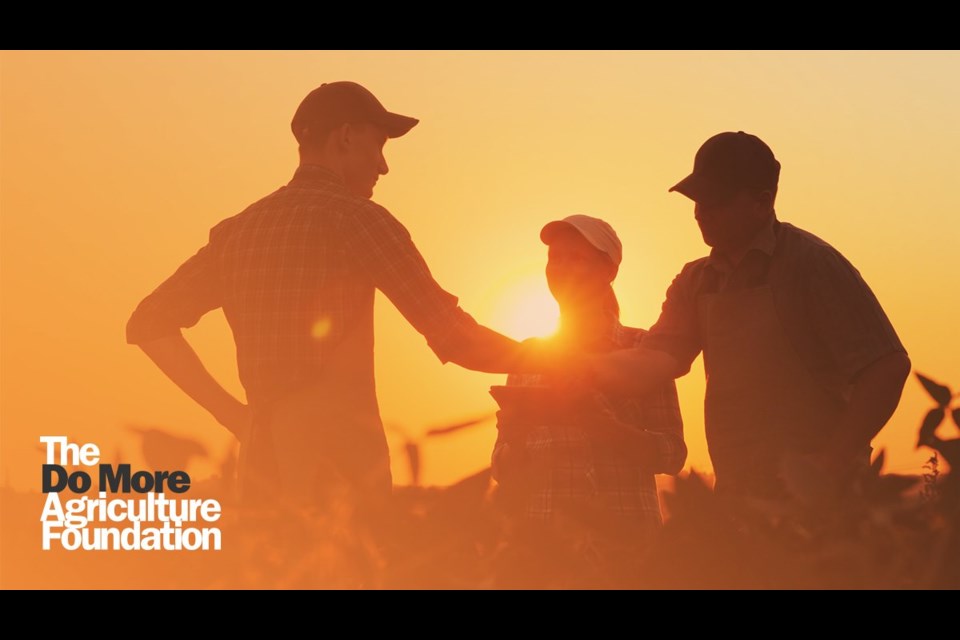The Do More Agriculture Foundation is reminding farmers they are not alone, during what will be for many of them a stressful third consecutive year of drought conditions in the province.
“This year has been another drought year, and for some producers, this has been the third year in a row,” said Megz Reynolds, the executive director of the Do More Agriculture Foundation.
“Harvest on its own is a very stressful time of year. You’re getting less sleep, spending less time with family and greater periods of isolation… and then of course there’s that time crunch and needing to get everything off the field before the weather falls apart…,” Reynolds explained.
Adding drought – or several consecutive years of drought – increases stress. Many farmers have been on the farm for four or more generations, and keeping the operation in the family is a serious concern.
“We need to be looking at ways to take care of ourselves during that time,” said Reynolds. Ask yourself what’s impacting you negatively and work to address these stressors by establishing boundaries.
Isolation is common with crop producers, and she suggests shutting down the combine for half an hour to share a meal with family and reconnect.
Sometimes you need a new perspective. “I remember one year I actually ended up putting electric tape over the yield monitor in the combine… every time I looked at the screen it wasn’t helping after a severe drought year,” said Reynolds.
It’s also important to keep social media use in check. “When you go on social media, you might be seeing people posting about how great their harvest is, while you’re struggling with very low yields,” she said. Even if others are trying to look more successful than they are, the repetitive message doesn’t help.
Typically, a drought season is followed by a few wetter seasons and producers can prepare for the next drought year. This helps mitigate losses, but with climate change shaping our weather patterns, this can’t be guaranteed. “The hits just keep coming more frequently,” stated Reynolds.
“We really link our sense of identity to our ability to farm. Even during a drought, which is entirely out of your control, it’s easy to feel like you’ve failed as a farmer,” explained Reynolds, who knows exactly how this feels thanks to her farming background. Many see their morale decline and may avoid talking about it with family. “It’s easy to feel that you’ve failed and you’re to blame,” she said.
You can recognize the signs of stress in yourself and others, and this includes irritability, being more reactive, trouble focusing, trouble falling asleep, and even increased alcohol consumption.
Stress also leads to isolation. If you’re avoiding phone calls or go shopping at the local Co-op and want to avoid conversations, that’s an indication stress has your mental battery drained.
The key is to develop healthy coping mechanisms.
Reynolds said you have to find out what works best for you and have something in place when you need it. “We all have different things that help recharge our battery as part of healthy self-maintenance,” she said.
Stigma is the biggest barrier to accessing mental health support in the agriculture sector.
Stigma can be internal or external. Internal stigma keeps you from acknowledging an issue and accepting the need for support. External stigma keeps you from booking an appointment and is focused on social feedback.
“The way to move the needle the most in agriculture is that external support,” she explained. We need to support one another by striking up more conversations.
“One of the big things I heard travelling across Canada… we’re at a stage now where we’re ready in the industry for that peer-to-peer support, but because of that stigma we still need to connect with someone who doesn’t know who we are,” said Reynolds. The AgTalk platform, launched this year, can help fill that need.
The AgTalk platform is fully online, and any adult can post and connect in an anonymous setting. AgTalk is available in French and English and is moderated by mental health professionals. Rather than doomscrolling on social media, Reynolds suggests you spend your downtime on the platform.
“One of the things that helps me the most [is knowing] we can’t control what we can’t control,” explained Reynolds. Figure out what you can and cannot control, and then break down the controllable parts into smaller steps you can address day to day, or hour to hour.
“Keep talking, keep reaching out, and keep finding ways to support yourself and don’t forget that you will make it through this season,” she concluded, noting that the most important step is to start the conversation.
The Do More Agriculture Foundation seeks to provide mental health awareness, helps strengthen a sense of community, and provides helpful resources to producers facing stress. “We are the national voice and champion for mental health in Canadian agriculture,” explained Reynolds.
Read about the organization’s Community Fund at https://www.domore.ag/community-fund.
For more information and helpful resources, visit the organization’s website at DoMore.ag.
To access the AgTalk platform you can visit their website at DoMore.ag/AgTalk.
The Farm Stress Line provides anonymous support, is available 24/7, and you don’t have to be in a state of crisis to call: 1-800-667-4442.
In response to some providers blocking access to Canadian news on their platforms, our website, MooseJawToday.com will continue to be your source for hyper-local Moose Jaw news. Bookmark MooseJawToday.com and sign up for our free online newsletter to read the latest local developments.




